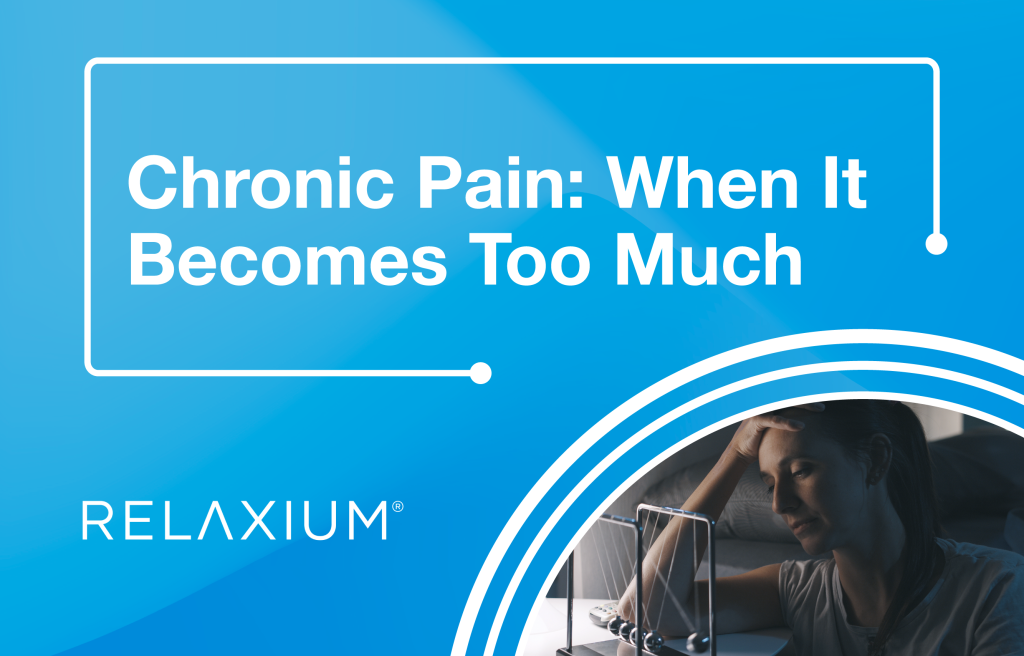Everyone has experienced some degree of pain in their lives. But for some people, their pain is chronic. Chronic or persistent pain can be defined as any pain that carries on for longer than 12 weeks despite medication or treatment. This means that chronic pain can sometimes last for weeks, months, or even years in some cases. It has often been linked to countless physical and mental conditions. When chronic pain becomes too much to handle, it often contributes to lost productivity, and higher than average health care costs. Chronic pain is unfortunately more common than not. A study found that an estimated 20.4% of United States adults suffer from chronic pain and around 8% of United States adults suffer from high-impact chronic pain. Both of these were found to be most prevalent in adults living in poverty, adults with less than a high school education, and adults with public health insurance.
Reasons for chronic pain
Now that we know that a large portion of adults in the United States suffer from chronic pain of some kind, what is the cause of this pain?
Chronic pain can stem from countless things. The most common cases of chronic pain come from lifelong illnesses, certain cancers, or arthritis. It can also be the effects of nerve damage, infections, back problems, previous surgeries, or other similar health conditions.
Chronic pain can also affect many parts of the body and could be one of the reasons for back pain, neck pain, headaches or migraines, muscle pain all over, neurogenic pain, arthritis or joint pain, or cancer pain near a tumor.
There isn’t one specific symptom for chronic pain. But in most cases, this level of pain will affect a person’s personal and professional life severely. According to The Cleveland Clinic, the most common physical symptoms associated with chronic pain include:
- Aching
- Burning
- Squeezing
- Stinging
- Stiffness
- Shooting
- Throbbing
Unfortunately there are also mental symptoms that are associated with chronic pain. These can include mental health issues and disorders such as increased anxiety, depression, fatigue, insomnia, or even mood swings.
Treatments for Chronic Pain
There is currently no cure for chronic pain. However, there are treatments that can lessen the impact of chronic pain for individuals.
An over the counter pain medication is usually recommended when someone is first experiencing signs of chronic pain. Non-steroidal anti-inflammatory drugs, or NSAIDs, are also typically recommended for treatment of chronic pain. NSAIDs can help reduce pain, decrease inflammation, decrease fevers, and prevent blood clots. The Mayo Clinic explains the usage of NSAIDs for chronic pain by explaining how they work. They stop certain enzymes in our body from being released which as a result, help to reduce the pain and swelling that results from injury.
Opioid pain medications are also sometimes prescribed for chronic pain. However, these often come with serious risks. They are mostly prescribed at a very low dosage, for a very limited amount of time. They are not recommended for long-term use.
Doctors may even prescribe certain antidepressants for treatment of chronic pain. Often, medications that are created for one condition can be useful for an entirely different condition. There are various studies researching exactly why these medications work for treating pain. They don’t know the exact reasoning behind it, but antidepressants have been shown to help with nerve damage, arthritis, lower back pain, and migraines.
There are also helpful lifestyle changes that can help remedy the pain associated with chronic pain. Increasing physical activity can be helpful, due to the fact that exercise releases endorphins which are natural painkillers. Dietary changes may also be helpful, since certain foods can worsen pain and inflammation. Acupuncture has also been shown to be effective in treating pain. It involves the insertion of fine needles into certain areas of the body to stimulate its natural healing processes. Another popular at home remedy for treating chronic pain is heat and cold therapy. Applying heat or something cold to the affected area can be beneficial. Try alternating between heat for pain or stiffness, to cold for reducing pain and inflammation.
Relaxium Calm to treat stress associated with chronic pain
Chronic pain is a complex issue that millions of people worldwide struggle with. It can be difficult to deal with the long term effects of constant pain. Chronic pain can cause mental effects, such as increased stress and worrying. Relaxium can not diagnose, treat, or prevent disease or serious pain. But it can be helpful to help minimize the excess stress that is often associated with chronic pain.
Relaxium Calm is an essential mood supplement that is formulated with Ashwagandha and other key ingredients that help to manage stress and promote overall relaxation. Using a whole body approach, Relaxium Calm supplies the necessary vitamins and minerals for mood support and for restoring serotonin levels. This calming supplement is drug-free, non-habit forming, and effective. It has been carefully designed to promote overall relaxation, help elevate mood, and supply vital nutrients.
Let Relaxium Calm be a relaxation booster on days your pain may be causing you an excess amount of stress.
You can order Relaxium Calm now for only $28.88. Make sure to use promo code CALMBLG28 at checkout!
To restful and healthy days ahead.
The Relaxium Team
*These statements have not been evaluated by the Food & Drug Administration. This product is not intended to diagnose, treat, cure, or prevent any disease.
Sources:
[1] Prevalence of Chronic Pain and High-Impact Chronic Pain Among Adults – United States, 2016 (cdc.gov)
[2] Chronic Pain (clevelandclinic.org)

